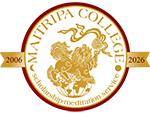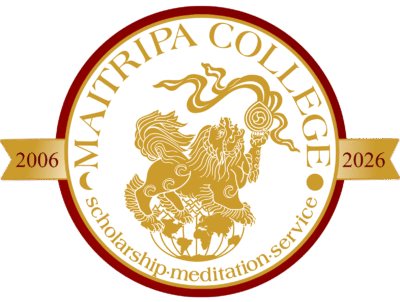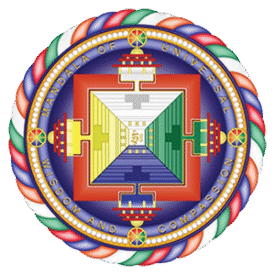Introduction
In the nearly fifteen years that I have been in dialogue with applicants of Maitripa College programs, a few main questions have arisen over and over. These questions are deeply felt and important, and, since they have arisen from many voices over the years, we have decided to focus this conversation around them.
Frequently Asked Questions from Applicants to Maitripa College
by Namdrol Miranda Adams, Dean of Education
1. Do I have to be Buddhist to come there? I’m not really sure about that.
Many, many students who start at Maitripa College approach me with this question early on, often with some anxiety.
And the answer is absolutely not.
At Maitripa College, we have no vested interest in what belief system you ascribe to or do not ascribe to. However, to be transparent, Maitripa College is a Buddhist environment, and we do follow Tibetan Buddhist religious norms in our meditation hall and other spaces. You are welcome to join in as you feel comfortable and you are also welcome to abstain. We only ask that you are respectful of everyone around you.
I also think it is important to note here that the Nalanda tradition of Buddhist thought, from which Tibetan Buddhism is directly derived, is a dialectical tradition that relies entirely on the questioning, discussion, and debate of the statements found in the texts. In the Ghanavyuha Sutra (Sutra of Dense Array), Buddha himself famously said: “O bhikshus and wise men, just as a goldsmith would test his gold by burning, cutting, and rubbing it, so you must examine my words and accept them, but not merely out of reverence for me.”
The use of reasoning and dialectical discourse as a method to understand the teachings is a hallmark of this tradition, and in that spirit we welcome and invite questions and challenges grounded in a genuine interest in understanding in our classes, discussion sections, and community. Without such dialogue, from our perspective, we could hardly claim to be an educational institution.
2. Will I have time for my life/job/partner/kids if I enroll in the program?
This question is also often asked accompanied by some level of anxiety, and the answer may do little to assuage it.
The answer is: this is completely up to you. We have one student here who has four children and is making it work, and others find that the demands of their work/home/families are simply too much.
In general, I advise people that it is likely not possible to do this program full-time and continue to make equal time for your life, job, partner, and children all at once, although some combination of that usually works out fine. But again, this is up to you to figure out. The Maitripa College program is challenging, both in terms of the content you will learn and in terms of the transformative elements that shape it, and that is usually surprising to incoming students. For this reason, we advise people to be patient with this part of the process, ask their families to be patient, and give themselves time and space to figure it out.
Additionally, historically at Maitripa students have attended and graduated from our programs while enrolled as both full time and/or part time students. This is an important option to keep in mind. It is completely possible to do our degree programs as a part-time student, and doing so may be a better choice for you.
3. What can I do with a degree from Maitripa College?
My favorite answer to this question comes from our teacher and President, Yangsi Rinpoche, who usually laughs when someone asks this, and says, “you can do anything.”
I think this bears some consideration. Rinpoche, who is a very modern teacher trained in a very traditional system (Sera Je, one of the great Tibetan Buddhist monastic colleges), is the founder and creator of the program of study at Maitripa College. In addition to being known as a great scholar and practitioner among the Tibetan community, Rinpoche has also had the very clear advantage in the west of being able to approach the development of education systems here with some amount of lucidity and genuine intent, unsullied by much in the way of complex motivation. Rinpoche came to this country, quite simply, to teach and to serve.
To Rinpoche, the purpose of an education at Maitripa, of an education anywhere, is to facilitate the ability of the student to do anything. This speaks to what in fact were the original goals of most education programs in the early days of the United States, which were intended to shape not only the intellect of the students, but also their “character,” those qualities of mind and spirit that cannot be learned, but can only be nurtured. As our society has developed, our priorities have shifted, and we are currently in the midst of a movement away from valuing holistic education that holds as its primary goal the development of the full potential of the human being. This question often arises from a grounding in that place.
At Maitripa College, through careful course design and intentional integration of both traditional and modern methods of teaching and learning, we are dedicated to providing an educative experience that is holistic, that supports not only your acquisition of knowledge and skills, but also the integration of that knowledge into your life, relationships, and service to the world. An education at Maitripa College can give you a foundation for becoming a Chaplain or Spiritual Care provider, a leader in your community, a translator, or scholar or many other things, but most of all, on the basis of an ancient tradition that teaches wisdom and compassion as two wings of a bird in flight, it will help you create the internal resources and resilience to do anything for the rest of your life.
Namdrol Miranda Adams
 Namdrol Miranda Adams, EdD, is the Dean of Education and a founder of Maitripa College. Since 1998 she has dedicated her life to the study and practice of the Tibetan language and the Tibetan Buddhist tradition. She has worked extensively with the texts of the tradition as an editor and translator of dozens of publications, has completed the major retreats on the sutra and tantra traditions of the lineage, and was ordained as a Buddhist nun for 7 years. >more
Namdrol Miranda Adams, EdD, is the Dean of Education and a founder of Maitripa College. Since 1998 she has dedicated her life to the study and practice of the Tibetan language and the Tibetan Buddhist tradition. She has worked extensively with the texts of the tradition as an editor and translator of dozens of publications, has completed the major retreats on the sutra and tantra traditions of the lineage, and was ordained as a Buddhist nun for 7 years. >more


